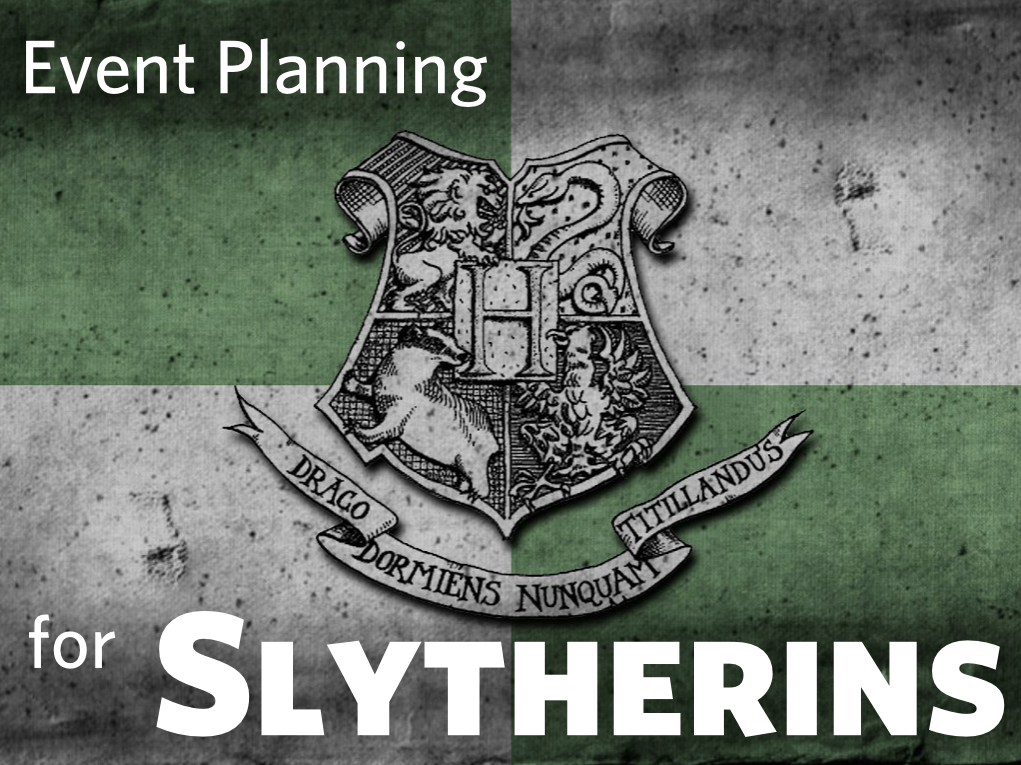The Slytherin's Guide to Getting Ahead in Event Planning
Would you describe yourself as:
- clever?
- resourceful?
- achievement-oriented?
Most of us don’t identify with Slytherin house. In the Harry Potter universe, Slytherins tend to be troublemakers, if not villains. But the author is careful to point out that Slytherins are not inherently evil.
A Slytherin might use any means to achieve her ends.
You can see how this could lend itself to bad behavior if not downright villainy. But in the business world, and particularly in the world of event and meeting planning, a little resourcefulness and an eye on the prize can give you a competitive edge–and even make your life easier.

Let’s talk about three ways you can embrace your inner Slytherin and use ambition to your advantage.
1. Turn the ship.
What could you do with unlimited resources?
We hear it from every side of the industry. Planners are being challenged to change the way events work because attendees expect it. Meetings are looking more experiential, and events need richer content. Attendees are going to other events with bigger budgets and a more flexible team, and they’re coming back with expectations.
What if you could reframe the way you think about your event, and take the budget constraints with you?
I asked Jeff Hurt about planners who see what needs to be changed but feel like they have to fight tooth an nail for budget and approval–and the old familiar is easier.
“I hear the adage about moving the ship all the time,” says Jeff. “But if you go back to the old model year after year, you can’t make significant change. If you go back to that model, you don’t own it.”
So you want to change the model so you can make your attendees happy.
What would a Slytherin do?
- Start out with the hypothetical. Set a goal for attendee growth or engagement (more about setting goals here) and then allow yourself to daydream a little. What would you have to do to get to 20% annual growth? How fast can you get there? Who do I have to hide a Horcrux in around here to get attendees to give me an 80% approval rating on “networking opportunities”?
- Get the lay of the land. Who do you need to impress to get your plan approved?
- Gather hard data from your attendees that informs the changes they expect. Learn about designing an event survey that can generate meaningful data.
- Find ways to shift budget in your favor. (Reducing paper printing is a big one, and here are some more ways to get more event for fewer Galleons.)
- Create a proposal that reframes the event budget and focus based around what attendees need and want–with the alternative being reduced engagement and attendance.
2. Premeditate to negotiate.
We’ll hear more from a negotiation expert tomorrow, but in the meantime let’s focus on one element: making negotiation part of your daily practice. If you wait until the big, stressful presentations to bring an audacious idea to a stakeholder you’ll be unprepared. It would be like waiting until the Olympics to try the triple lutz.
If you recognize that you negotiate daily (with vendors, with your loved ones, with the guy at the magical supplies emporium), you can build the skills you need to negotiate intelligently when the stakes are high. Begin today–the next time a decision needs to be made, take some time to reflect on the way you handled it.
Were you cognizant of the emotional state of everyone in the room, and did you adapt accordingly?
Or did you resort to the same set of tactics you use for everyone?

Skilled negotiation is about building a toolkit of methods. Slytherins are clever, quick-witted and perceptive about the mood in the room.
3. Skip some steps.
Harry never graduated from Hogwarts, and he went on to be (spoiler alert) one of the most famous Aurors of his day. Do you really need that CMP?
As an almost-half-Slytherin, Harry can teach us something about skipping traditional steps. Many planners choose to receive their CMPs (more on detailed preparation and tips for getting your event planning certification), but there’s a pervasive argument that it’s absolutely no longer necessary. When planning is more about digital skills, engagement science and critical thinking, perhaps an institution that produces planners who can estimate room sizes is antiquated.
Learn more about how the event coordinator job description has changed irrevocably–and determine for yourself whether, these days, planners need the 6-month investment.
Are you ready to put on the Sorting Hat? If you’re committed to getting ahead in event planning, you might just find yourself in Slytherin!


